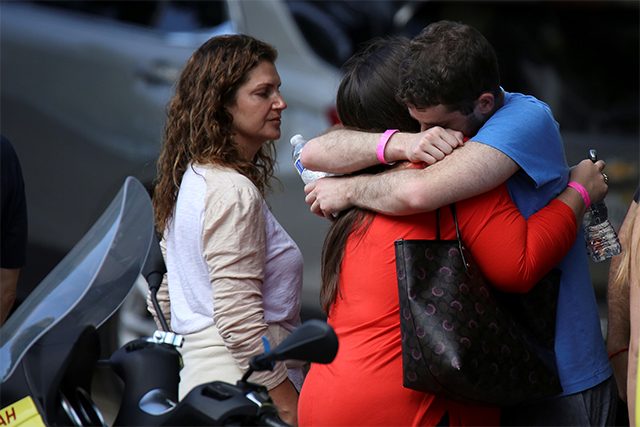
SURFSIDE, Fla., — Some families of the missing at the Miami-area building collapse have found comfort in therapy dogs brought in during the agonizing wait for news.
With some 150 people unaccounted for, many of whom could be buried beneath the rubble, the Boricuas de Corazon disaster relief team brought in a pair of four-legged friends: Tal, a 7-year-old Akbash weighing 130 pounds (59 kg), and Molley, a 1-year-old Walker Coonhound.
The dogs could help victims process their emotions, said Linda Perez, president of Boricuas de Corazon, a nonprofit group dedicated to helping disaster victims. Boricua is a nickname for Puerto Ricans, and the group offers service in English and Spanish.
So far the dogs have linked up with at least four families from Argentina, another from Paraguay, and others who came in from Houston, Perez told Reuters.
“They’re having panic attacks or anxiety problems and we have been able to let them work with the dogs, touching the dog, getting their emotions out,” Perez said.
Relatives of the missing have been waiting since Thursday morning for any signs of life from their loved ones.
“They can feel the dog, they can be able to have that contact with their eyes. It’s very neat. Animals are absorbing everything emotional that they are feeling at the same time and they can be able to be very relaxing for them,” Perez said.
The organization partners with other groups that train therapy dogs and is prepared to stay with the victims for hours on end, as needed.
One distraught woman asked for extended canine companionship while awaiting the arrival of her daughter from out of state and was told she could have support around the clock, Perez said.
“These people are suffering,” Perez said. “Getting information little by little is not pleasant for them. They are under a lot of pressure.”
—Reporting by Arlene Eiras and Julio-Cesar Chavez Writing by Daniel Trotta Editing by Matthew Lewis









